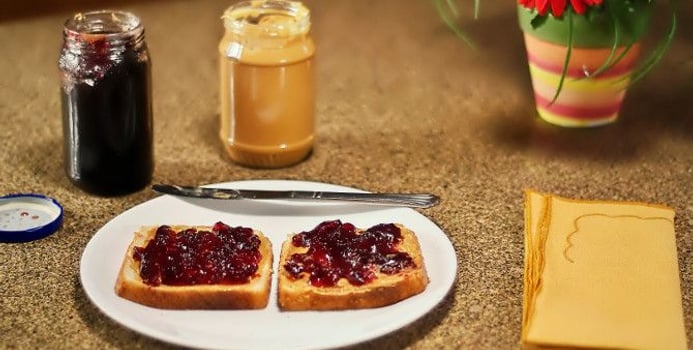Did you know that it takes roughly 520 peanuts to make a 12-ounce jar of peanut butter? Or that the peanut industry contributes over $4 billion dollars each year to the U.S. economy? How about that the average person will consume over 1,500 peanut butter and jelly sandwiches before they graduate high school?
I know, I know, such random but interesting information, right?! Not only is peanut butter so versatile in cooking, it's also quick, affordable and super nutritious. Peanut butter is packed with protein, at over 8 grams per 2 tablespoon serving, and healthy mono and polyunsaturated fats. Peanut butter is also packed with other essential vitamin and minerals, like phosphorus, potassium, zinc, folate and vitamin E. These nutrients are vitally important in keeping energy supplied to our bodies to allow muscle contractions, as well as providing nutrition to maintain our immune system. Plus, recent research shows that peanut butter contains phytonutrients, such as resveratrol, that acts as an antioxidant in our bodies to help protect against cancer and cardiovascular disease.
Peanut butter tends to get a bad rap when companies begin to tweak their ingredients so much to fit the ever changing flavor profile of the American public. To be classified as a true peanut butter, a product must contain over 90% peanuts and be free from artificial sweeteners, colors and preservatives. As I am sure you've seen, the issue today lies in the added sugars and fats that are combined to produce the most satisfying product to the customer, which unfortunately comes in the form of added trans fats.
The key to choosing the right peanut butter is finding a natural brand that contains only peanuts and salt.
If you're watching your calorie intakes and want to decrease the energy intakes you get from peanut butter, you can always opt for the powdered peanut butter variety. These products are made from pure ground peanuts with the oil extracted. One must reconstitute the product with water to get the same creamy consistency. Personally, this is my go to when I choose peanut butter!
If you're looking for more information on peanut butter, be sure to check out the National Peanut Institute.
Elizabeth Shaw, MS, RD, is a San Diego based dietitian. She is owner of Elizabeth Shaw Consulting Services, in which she offers individual, corporate and food service consulting services. She an adjunct professor in Nutrition at San Diego Mesa Community College and is the Dining Dietitian for the University of California San Diego. Read her blog, Simple-Swaps, and connect with her on Facebook and Pinterest.




